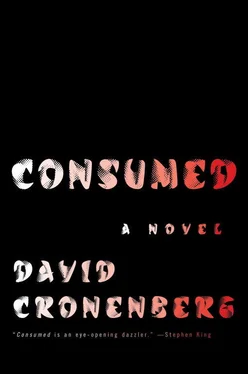I walked out of the Jungebluth Clinic with my ears tuned to my safe, unaltered Program 1, unaccountably fearful of walking on the streets of Vanves while on Program 5—what could happen?—and having forgotten where the Smart Fortwo was parked, as was increasingly usual for me. Fortunately, my iPhone, which was now propping up my failing brain, had the GPS coordinates ready at hand, and its Maps turn-by-turn guidance system got me around the three corners to the little vehicle, which looked so dapper in its Matte Anthracite replaceable body panels. I was aware that I was taking inordinate pleasure in small, technological events and objects, and that this was probably a semiconscious tactic meant to evade confronting certain agonizing life events which were probably not resolvable and were destined to cause unrelenting pain and distress; yet the pleasure was real, and I took it greedily. Once I was in the car, I thought, I would switch to Program 5, the Vertegaal, and allow the new settings to flow sounds never before perceived through my brain; but then I didn’t. My rationale was that the electric car was too quiet, too well insulated—against temperature changes, in order to save the battery, but effectively damping sounds as well—to really deliver anything spectacular, and then I would be disappointed, and then I would get depressed. That was the rationale. But was the whole exercise not really about one thing: the left breast of Célestine? Why play with toys?
I arrived back at our apartment with my head buzzing as though it were the vessel full of truculent insects; perhaps it was my head that needed to be removed. Célestine was not there. I could not possibly read. I switched on the TV and began to watch the MotoGP world championship motorcycle race from Aragón, broadcast on delay. I knew nothing about MotoGP, but was immediately entranced by the machinery, the strange, padded, hunchbacked leather riding suits bearing ceramic sliding pucks Velcroed to their knees, the futuristic helmets, and the ferocity of the racing. The commentators discussed the increasing sophistication of the electronic controls on even these elemental machines, a worrisome thing, they said, because it took so much control of throttle, traction, braking, pitch control and even lean angle away from the riders that one wondered whether riders would soon be rendered obsolete. Needless to say, the questions of technology raised by the racing stimulated me and happily distracted me, especially since the technologies of MotoGP and Siemens hearing instruments were seeping into each other so that I was soon feeling traction control, anti-lock braking, g-force sensor, and electronic-control-unit elements beginning to operate in my ears. It occurred to me that the speakers of our poor old Loewe, only banal stereo, not 5.1 or 6.1 or beyond, were still quite good, and I was tempted to switch to Program 5 just to see what it would do to the unearthly sound of those multi-cylindered motorcycles. Would it create a brilliant form of Grand Prix motorcycle-empowered hearing? My index finger was actually hovering over the rocker of the left behindthe-ear module when I heard Célestine’s keys jingling as she approached the narrow landing outside our door. Mild claustrophobia normally kept her from using the compact elevator, so she could be heard from quite some distance down the spiraling stairs. I switched off the TV as two Spanish riders started their final lap in the lead, to the wild delight of the Aragón crowd, but the half-life decay, the aftertaste of blended MotoGP/hearing-instrument engineering, remained for quite some time.
WE WERE IN THE HABIT of having our most intense, most abstract and intellectual conversations in bed, usually fully clothed but not always. Even if it began as something mundane, something merely functional, in the kitchen or in front of the Loewe, once it drifted into that territory that we subliminally recognized, we ourselves drifted, as if randomly, into our small bedroom and would lie down together without having missed a beat in the rhythm of our talking (the pillows occasionally making my Pures squeal petulantly with feedback), and with the conversation sometimes ending with a profound nap, or profound sex, both the nap and the sex infused with the thematics of our talk. There were pens and stubs of pencils strewn everywhere in the bedroom, evidence of our habit of scribbling notes for future papers, articles, letters to editors, at any moment of the day or night, during or following our bed sessions. We made sporadic forays into the world of voice-recognition spoken-note-taking using iPad or iPhone, but inevitably reverted to the handwritten word. We both had appalling handwriting that required considerable decipherment even by the writer, but the very act of decipherment was comforting, the contortions of the scrawls conveying emotion and nuance that no perfect pixels could embody. Speaking the words seemed to release them into a void in which they could evaporate unexpectedly; writing them seemed to encase them safely within our skulls, where they could leisurely ripen.
Célestine headed for the bedroom first, tossing her keys into the wooden Chinese bowl we left on the glass half-moon table by the door, kicking off her shoes and flopping down on the bed with a long, slow sigh. As usual, I followed her, half-sitting rather than stretching full out, my shoes already off.
It was apparent to both of us that we were going to talk about Romme Vertegaal, with no preliminaries, no banter about parking difficulties or what was missing in the refrigerator. Earlier in the day, she had been to the Entomological Society’s office again, hoping that her contacts there had some news of Romme’s whereabouts or latest projects. She had turned to them in desperation after our colleagues at the Cannes Film Festival were unable to provide any enlightenment. Judicious had been handled entirely by a North Korean government film and media agency, and they never had any interaction with the director of the movie himself. It had been hinted that he had somehow disgraced himself in Pyongyang and was lucky not to find himself in prison. There had never been any chance that he could accompany his movie to Cannes as most directors do; the festival had decided to accept this onerous condition in the hope that it would at least open the door to more interchange with North Korean artists. The executives of the festival would not accept Célestine’s contention that Jo Woon Gyu was not Korean, not Asian at all, but was a French national born in Holland. Disbelief and dismissal soon turned to irritation, and Célestine’s entreaties—phone calls, emails, street interventions outside the Paris offices of the festival—quickly became moments of embarrassment for everyone that were best forgotten. The pair of us were used to becoming embarrassments in political and social causes of all stripes—it was a badge of honor; you could not worry about dignity or reputation when it came to hot-button issues—so this in itself was not hard to take, but the emotional stakes in this instance were very high, and Célestine in bed next to me was enervated, dispirited.
“Look at this,” I said, handing her my iPhone.
She covered her eyes with her arm, flexing her fingers so that her forearm muscles bunched rhythmically, exuding anguish and aggravation. “I can’t look at your ironic little pictures right now. Please.” I was in the habit of bringing back cell-phone photos of things I encountered during the day, just like a dog with an amusing stick in its mouth. I believed I took these photos in innocent amazement at the richness of mundane reality, but Célestine, on the contrary, detected revulsion and existential dismay skulking under every shot. I no longer contradicted her on this point.
I slid down on the bed until we were side by side. “This picture has a very special irony that you’ll want to experience. I promise.” She rolled over abruptly and grabbed me by the hair with both hands, inducing my Pures to complain bitterly. I used to pull them out of my ears and toss them onto the night table at such moments, fearing an interruption of intimacy, but we had gotten so used to their companionship that it never occurred to me to do that now. “A promise like that is a dangerous thing,” she said. “I’m in a perilous, slippery state of mind. One of your shots of inane parking signs could push me right over the edge. And I’d never come back.” She kissed me a full, openmouthed kiss, then pulled away as though shocked by what she had done, her own little act of irony. “Well, let’s see it. I’m not going to be easy to impress.”
Читать дальше
Конец ознакомительного отрывка
Купить книгу







![David Jagusson - Fesselspiele mit Meister David [Hardcore BDSM]](/books/486693/david-jagusson-fesselspiele-mit-meister-david-har-thumb.webp)




